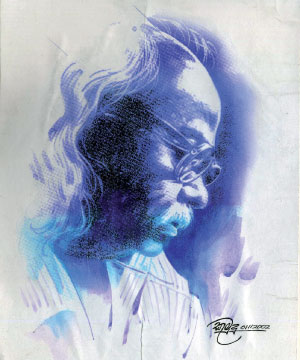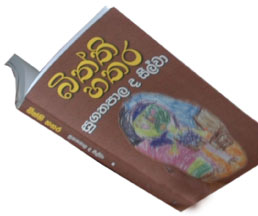|
Remembering a milieu-defining dramatist:
Sugathapala de Silva and contemporary Sinhala theatre
By Ranga CHANDRARATHNE
‘’Let nothing be called natural
In an age of bloody confusion,
Ordered disorder, planned caprice,
And dehumanized humanity, lest all things
Be held unalterable!’’
Bertolt Brecht (1898-1956), German dramatist, poet. The Exception and
the Rule, Prologue (1937).
“For if Ediriweera Sarachchandra gave the Sinhala theatre a local
habitation and a name by taking it to its roots in folk drama Sugath as
everybody knew him, accomplished the next task of bringing the new
theatre to the audiences of the 1960s. It has been said of the Russian
novel that it emerged from Nikolai Gogol’s ‘Great Coat.’ In the same
sense all serious Sinhala drama of today has emerged from Sugathadasa de
Silva’s womb although he may not have fathered them himself.
 Dissatisfied with his own translations and adaptations of the plays
of Moliere, Gogol and Chekhov (done in collaboration with E.F.C.
Ludowyke and A.P. Gunaratne) Sarachchandra after studying the Japanese
folk theatre turned to our own nadagam, kolam and sokari plays and the
thovil ceremonies to seek the roots of an indigenous theatre which would
evoke a resonance from the soul of a people only recently liberated from
the imperial yoke. The fruit of this labour was, of course, ‘Maname’ his
refined adaptation to the stage of the original nadagama as enacted by
Charles Silva Gunasinghe Gurunnanse of Balapitiya. Dissatisfied with his own translations and adaptations of the plays
of Moliere, Gogol and Chekhov (done in collaboration with E.F.C.
Ludowyke and A.P. Gunaratne) Sarachchandra after studying the Japanese
folk theatre turned to our own nadagam, kolam and sokari plays and the
thovil ceremonies to seek the roots of an indigenous theatre which would
evoke a resonance from the soul of a people only recently liberated from
the imperial yoke. The fruit of this labour was, of course, ‘Maname’ his
refined adaptation to the stage of the original nadagama as enacted by
Charles Silva Gunasinghe Gurunnanse of Balapitiya.
He reached the apogee of these labours with ‘Sinhabahu’, his own play
where with skilful stylised movements, memorable poetry and haunting
music he was able to narrate the story of the origin of the Sinhala race
and suggest through it a contemporaneous generational gap.
But by the early 1960s the stylised form had spawned mindless
imitators who had made a caricature of Sarachchandra’s mode. What is
more, there was the feeling that the mode had exhausted itself and it
was this new thinking which Sugath’s generation represented.
This was a generation of bi-lingual youth either of urban origin or
who had come to Colombo in search of the pot of gold at the foot of the
rainbow. They were a middle class generation working in newspapers or
the advertising industry.” - Wrote Ajith Samaranayake in his Sunday
Essay on the demise of Sugathapala de Silva following a prolonged
illness. In his last days though active, he was bed-ridden. However, he
translated Sam Selvadorai’s ‘Funny Boy’ into Sinhalese.
Sugathapala de Silva’s pivotal role in Sri Lankan theatre should be
assessed against the backdrop of evolution of Sinhala theatre. If Prof.
Ediriweera Sarachchandra brought about a dramatic transformation in
Sinhalese theatre with his adaptations of traditional Nadagam into
highly crafted plays suited to proscenium stage, Sugathapala de Silva
shaped the contours of the next stage of development in Sinhalese
theatre by bringing new drama into it. At first, Sugathapala de Silva
began to translate and adopt foreign plays such as those of Tennessee
Williams and Pirandello following the formation of loosely-kitted drama
group ‘Apey Kattiya’.
Sugath recalled how an informal gathering of like-minded youth led to
the birth of drama society which almost dominated the next phase of the
Sinhalese theatre. Sugathapala de Silva stated:
“On hearing my criticisms, one day Cyril B Perera challenged me. You
criticise each and every drama, can you produce a good drama? Those days
(1962) Arts Council had advisertised in newspapers for drama scripts for
State Drama Festival. Though I wanted to present my drama script
‘Bodinkarayo’ (Boarders), we had no drama society to fill the lines ‘the
society which presents the drama’. We discussed what we were going to do
as we did not have a drama society. Different views were expressed.
Meanwhile, I saw, one day, Cyril B jotting down on a piece of paper the
word ‘‘Apey Kattiya’, I liked the name. Later it became ‘Apey Kattiya’
(our group). We had no chairman. If someone asked how he could join the
group, I invited him to spend an evening with me. Over a drink, I
chatted with the person for one hour or two, and then I knew whether
that person would remain with us or will break away from the group. Thus
six persons joined "Apey Kattiya.”
Though there wasn’t a formal leader for Apey Kattiya, Sugath was the
undisputed leader of the group which produced a number of landmark plays
in Sinhala theatre such as Thattu Geval and Boarding Karayo. Thattu
Geval (Flats) and Boarding Karayo (Boarders) encapsulate the sub-culture
of newly city-bred middle class and their socio-cultural ethos. Among
his repertoire of plays includes Eka Walle Pol, Boodin Karayo,
Hithahonda Ammandi, Harima Badu Hayak, Mutu Kumari, Esala Sanda , Marat
Sade and Snthuvara sebalano.
Bilingual par excellence
Sugathapala de Silva belonged to a generation of bilinguals who
derived the best from both Western and Eastern knowledge base. Apart
from being a gifted dramatist, Sugathapala de Silva was an excellent
translator. Some of his translations include Ata messa- Gad fly ,
Hathara veni Thattuva, Deiyampa Sahathika Eththa, Re bo ikbithi -When
nights fall, Amuthu Ilandariya (Funny Boy), Ginidalu mal, Marasadh. One
of the remarkable features of his translations and adaptations was that
they became masterpieces in Sinhalese and contributed not only to the
enrichment of language of drama in Sinhalese but also the Sinhala
language in general.
He firmly believed that translations should not be mere mechanical
word for words translations which have destroyed many of the original
dramas in their Sinhalese versions, but should be done according to the
prosody of the target language.
 This is one of the reasons that made Sugathapala de Silva’s
translations such as Ata Messa (Gad fly) and Marasadh are still popular
in Sinhalese theatre. Sugathapala de Silva’s play ‘Dunna Dunu Gamuwe’
which was made in the aftermath of the 1971 insurrection had a lasting
impression in Sinhalese theatre triggering off a trend in the production
of political dramas. Though the play was centred on a trade union
struggle it had a fine mixture of politics with the defining techniques
of the medium. It should be mentioned here that it was Sugathapala de
Silva who introduced some of the novel techniques such as players
walking to the stage through the audience which was quite revolutionary
at the time. This is one of the reasons that made Sugathapala de Silva’s
translations such as Ata Messa (Gad fly) and Marasadh are still popular
in Sinhalese theatre. Sugathapala de Silva’s play ‘Dunna Dunu Gamuwe’
which was made in the aftermath of the 1971 insurrection had a lasting
impression in Sinhalese theatre triggering off a trend in the production
of political dramas. Though the play was centred on a trade union
struggle it had a fine mixture of politics with the defining techniques
of the medium. It should be mentioned here that it was Sugathapala de
Silva who introduced some of the novel techniques such as players
walking to the stage through the audience which was quite revolutionary
at the time.
Sugathapala de Silva’s books and dramas will register in mind
particularly for their extremely rich dialogues. For instance, the
dialogues of Banduwardena and Ratnasekara in Ballo Bathkathi are
prophetic.
“Sri Lanka has wonderful creatures. However much men from the lower
rung serve the masses, the people will forget them as soon as they turn
the other way. If it is to be recognised, one should come from high
class. People even accept Buddhism because it was preached by a prince.
If people really want to develop the country, they should be born
into right parents. Because, still we have feudal values” (Ballo
Bathkathi-page 71)
“You train people to hate. Can you solve problems with hate? The
other side of hatred is love. Therefore, understanding is more important
than hatred. “
–(Ballo Bathkathi-31)
Known as the ‘lovable dictator’ of Sinhalese theatre, Sugathapala de
Silva will remain in the heart of thousands of theatre- goers and
theatre lovers as colossus, and a man who defined his era. He was
essentially a product of the era which was dominated by self-less
artists who dedicated their lives to the arts they passionately believed
in.
The greatest tribute that the present day dramatist particularly in
Sinhala medium could pay to Sugathapala de Silva is to aspire to the
heights that he reached through dint of perseverance and dedication.
|

